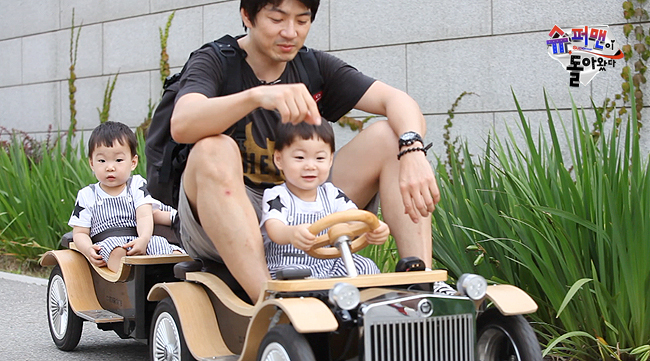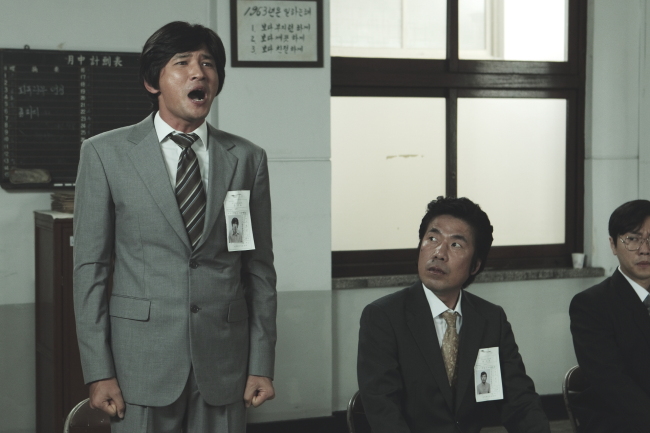[Weekender] Family fantasies in Korean media
Popular TV shows and films reflect evolving experience of fatherhood
By Korea HeraldPublished : April 3, 2015 - 19:56
Working mother Kim Jin-ha rarely watches TV, but she’s grateful for one reality show ― “Superman is Back.”
The show, which features celebrity dads caring for their young children without the help of their wives, somehow motivated Kim’s husband to spend more time with their 4-year-old daughter. His involvement in child care gradually improved his relationship with Kim as well.
“When we first got married, we got into a lot of fights because he knew nothing about domestic work. He only knew how to make ramen and wouldn’t put his own socks in the washing machine,” Kim said.
The show, which features celebrity dads caring for their young children without the help of their wives, somehow motivated Kim’s husband to spend more time with their 4-year-old daughter. His involvement in child care gradually improved his relationship with Kim as well.
“When we first got married, we got into a lot of fights because he knew nothing about domestic work. He only knew how to make ramen and wouldn’t put his own socks in the washing machine,” Kim said.

“And it got worse when we had our daughter four years ago. We were both working, but I was mostly in charge of child care and domestic errands.”
Kim and her husband, both 34, work in the finance industry, and spend nine to 12 hours at work each day. The mother said her husband is still not a fan of doing laundry or cooking, but is more willing to play with his daughter on weekends after watching numerous episodes of “Superman is Back.”
Among many celebrity dads featured in the show, Kim’s husband particularly loved watching martial arts fighter Choo Sung-hoon and his daughter, Sa-rang.
“I think he didn’t expect someone like Choo Sung-hoon, whose outward appearance is athletic and tough, to spend such quality time with his little daughter,” Kim said.
“I think watching Choo gave my husband this unexplainable sense of jealousy and confidence ― that if Choo can pull it off, then he can pull it off, too. Anyhow, it all worked in my favor. My quality of life, especially on weekends, improved dramatically.”

Experts say TV shows such as “Superman is Back” and “Dad! Where are we going?” are a positive influence on today’s Korean society, where more working fathers are taking paternity leave to spend time with their children. The number of dads who chose to take the leave increased by almost tenfold ― 863 percent ― from 2008 to 2014.
Kim Eun-hee, a scholar at the Korean Institute for Gender Equality Promotion and Education, said the TV programs challenge the “maternal myth,” the notion that women are meant to be naturally maternal and therefore better caregivers than men.
“By watching these programs, viewers learn that with time and practice, dads can also become great caregivers to children. The dads in the shows, who at first don’t know what to do when babies are crying, become so much more adept at parenting in later episodes,” Kim told The Korea Herald.
“Viewers also get to watch the dads grow as human beings as they witness their children grow at the same time. And I think that’s important. No one just becomes a parent ‘naturally.’ Becoming a parent requires time and learning, both for mothers and fathers.”
Kim said she especially enjoyed an episode where Lee Hwi-jae, a popular TV presenter and a dad of twin boys, makes friends with other mothers in his neighborhood.
“Most Korean men interact with people they meet at work,” she said. “But by spending more time with their children, they can also connect with their neighbors. It makes their lives more interesting and meaningful that way; their lives become more than just work. Communities are important for both parents and children.”
In spite of the increase, however, the number of dads who took paternity leave last year only accounted for 4.4 percent of all working fathers in the country.
Some critics say such TV shows in fact reflect the bleak reality where most of fathers cannot opt to spend more time with their family. “People tend to want to see what they don’t have or can’t achieve. It’s called having a fantasy,” said culture critic Lee Moon-won.
With soaring youth unemployment, limited job security ― 1 in 5 young adults started their careers in contract positions as of last year ― and household debt, more than half of South Korean millennials said today’s children will not be better off than their parents, according to a survey by American think-tank the Pew Research Center in 2014.
“I don’t think you can even consider work-life balance when your priority is to feed your child first,” said Ahn Sang-soo, a researcher at the Korean Women’s Development Institute.
Culture critic Lee said another popular reality variety show “We Got Married” ― which features paired-up celebrities in faux-marriages to show what it would be like if they were married ― and the recent silver screen hit “Ode to My Father” ― a heart-wrenching tale of a self-sacrificing Korean father who belongs to the postwar generation ― show the opportunities Koreans have lost in the recent years.
“Not many young Korean men can afford to take a girl out to a pricey restaurant like the men do in ‘We Got Married,’ or get married at all,” said Lee.
“And with this bleak view of the future, not many fathers today would volunteer to sacrifice themselves for their family like the character in ‘Ode to My Father,’ because they no longer believe that hard work guarantees a better future for the next generation.”
By Claire Lee (dyc@heraldcorp.com)
-
Articles by Korea Herald



















